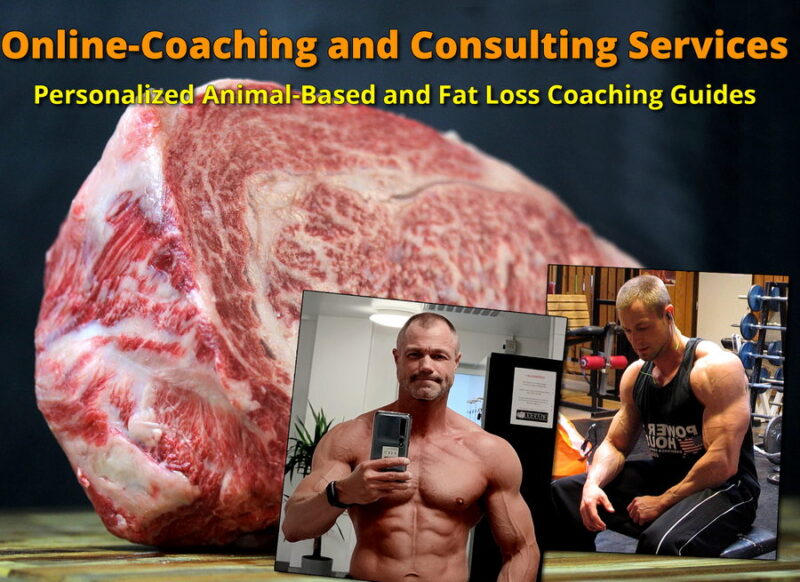Before we start, there are some ‘universal truths’ that are not debatable, such as the scientific and physiological fact that humans are obligate hyper carnivores; that we are physiologically built for the consumption of animal fat and animal protein. This also means that anything from the ‘plant kingdom’ is toxic and potentially harmful to us. In addition, plants in general are extremely low on bioavailable nutrients, which means that we as humans have a very hard time extracting the little nutrition found in said plants. And also, we have an even harder time converting the little nutrition we may extract into something usable, as it’s not in organic form (as found in animal tissue.) In other words, plant-based foods are not only toxic, but completely useless as nutrition.
This realization within the information age has re-ignited the ‘carnivore movement,’ which actually should be called the ‘animal-based’ movement, as the term ‘carnivore’ implies that at least 20% of what you eat is raw directly from an animal – and most people who proclaim themselves as ‘carnivores’ cook their food, as in processing it. That is not ‘carnivore.’
With that being said, only consuming cooked animal food is much better than the ketogenic diet (which may contain toxic plant-foods and seed oils,) a thousand times better than following a modern “balanced” diet, or an infinite number of times better than any kind of plant-based “vegan” slave diet.
Still, cooking means processed, as in unnatural, and that is not ‘carnivore.’ And cooking degrades the protein and robs the food of nutrients, especially electrolytes, and that is why those who follows a ‘cooked animal-based’ diet need to add in electrolytes, such as sodium, potassium, and at times magnesium. And this loss of vital nutrients is also why many who follows a cooked ‘animal-based’ diet may run into some problems, especially if you cook your meat past ‘medium rare’ – as they might add sodium, as in salt, but not enough potassium, magnesium, and other minerals that get lost. Another problem is relying on too much low-fat meat, and not getting enough fat from other sources, as in a skewed protein to fat ratio (I’ve explained this in previous articles.)
Now, when I coach and educate my clients, I explain all this, and I also start everyone off on a ‘cooked animal-based’ diet, because people are used to cooked food, and making drastic changes is not for everyone. It has to be done gradually. Also, your body need time to re-adjust to every change you make. So, when someone decide to adopt our natural human species-specific diet, they first need to transition from where they currently are and into a ‘animal-based diet’ over the span of several weeks. As in going from a “balanced diet” to a “ketogenic diet” and then to a “animal-based diet.” From there, it’s your preference and decision whether you want to reach the final stage in optimal health and mental clarity by going carnivore, as in consuming some or all of your food raw.
As a coach, I give you all the tools and motivation to succeed in all these steps, but it’s up to you where you want to be and what is ‘good enough’ for you.
So, if you cook all your meat and organ meats, and/or if you use other processed food such as dairy (unless it’s raw,) please refer to yourself as ‘animal-based,’ and not as ‘carnivore.’
If you on the other hand eat some or all of your meat and organ meats raw, including raw eggs (or at least the raw egg yolk,) then you can label yourself as carnivore, and only then, are you actually following our proper and natural species-specific diet. We are simply a species, like every other animal, and no other animals that belongs to the carnivorous species cook their food. Our digestive system, and especially our incredible low stomach acid pH is made for raw food and even scavenged kills, as in fermented/rotten meat.
And no, all that nonsense about “harmful” bacteria, parasites, E. coli, salmonella and such from animal produce is all complete bullocks. I’ve covered that many times too, and we have a lot of informative discussions on that topic at our uncensored community Ungovernable.se.
Personally, I only warm my meat to room temperature before eating it, and sometimes I sear the meat on the lowest possible heat for a few seconds, leaving it practically raw. And as for organ meats and eggs, I eat all that raw. Sometimes I do heat the egg white on the lowest heat setting, just to let it coagulate a bit. The only ‘processed’ food I consume is butter and/or ghee, and at times a pure non-flavored whey concentrate powder (which is simply cold-dried milk) because of all the minerals and to make it easier to reach my protein requirements as I’m never hungry or directly interested in food.
So, per definition, I’m ‘carnivore’ (more than 20% of my food is raw,) but I prefer to say that I simply eat in accordance to our species – or at least as well as I can (as some of my food is ‘processed’ a couple of times a week.)
And remember, you do not have to be ‘carnivore’ all the time to reap great benefits. You can, for example, eat all your food raw when you’re at home, and still have some cooked food when you’re at your workplace, or out eating somewhere else. Just opt for the ‘rare’ variants.
If you need help or want some guidance with nutritional plans, health issues, fat loss, and/or transitioning from your current way of eating to our natural species-appropriate, species-specific way of eating, or going fully ‘raw’ carnivore, I’m available for both coaching and consultation.

